

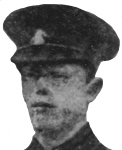

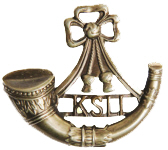
No. 29211, Sergeant, Claud BROOKS D.C.M.
Aged 26

|
Born Lakenheath, registered Mildenhall Q4-1892 [4A:741]. 1901 census...Aged 7, Claude was living at High Street, Lakenheath with his father- William George BROOKS [40] general labourer born Worlington; his mother Rosina Flack (née CRANE) [39] born Lakenheath; brother- George [19] apprentice harness maker, born Lakenheath; brother- John [17] yardman on farm, born Lakenheath; sister- Rosina [9] born Lakenheath; brother- Lewis [3] born Lakenheath. 1911 census...Aged 17, farm labourer, was living in Chettisham, nr. Ely with his father (horsekeeper on farm), mother, brother Lewis (farm labourer) and new siblings brother- Edward Kitchener [8]; sister-Jemima [6] and sister- Eliza [4] all born in Lakenheath. The 1911 census reveals that William and Rosina Brooks had a total of 18 children, but that 8 had died before 1911. After Claud's death they were living in Black Horse Drove, Littleport. His first name is variously recorded as Claud or Claude. |

|
Citation for his Distinguished Conduct Medal: 3/10/18
29211 (late 26586) Sjt. C. Brooks (Ludlow) For conspicuous gallantry and devotion to duty. During a counter-attack, when his platoon officer had become a casualty, this NCO took command of the platoon, leading them with conspicuous gallantry and skill, he re-captured and re-established the portion of the line that was his objective. He then went out in broad daylight with a fighting patrol and drove the enemy out of a strong point and captured a machine gun. Later he brought in two wounded men under heavy machine gun and rifle fire. The action that his DCM was awarded for took place at Montagne-de-Bligny on 6th June 1918. Bligny Hill is in the Champagne region of France and was where the Germans had switched their attentions to the much weaker French sector� an area where British troops had not previously been involved. 4th K.S.L.I. made a fighting retreat from Chambrecy, being rapidly reduced to only 350 men by June 5th, when it was halted near the Montaigne de Bligny, a hill dominating the area. The 4th K.S.L.I.were in support initially, with the N. Staffordshires and Cheshires holding the hill. At around 6.00 a.m. on the 6th June, the German attack began and by 8.00, the North Staffs and Cheshires were taking heavy casualties on Bligny Hill. By 9.30 a.m., the Germans had taken the hill and the Cheshires and North Staffs were fighting their way down its slopes towards the 4th KSLI, who were ordered to counter attack at 12.45 p.m., after a brief artillery barrage; its aim was to retake the crest and drive off the German defenders. The barrage never happened, but the attack went ahead anyway. From their trench line near Chaumuzy, the battalion had to cross about a mile of open fields, full of standing corn, in clear view of the Germans on Bligny Hill. Of the fewer than 200 men of 4 K.S.L.I. who attacked across the open fields, 80 were casualties by the time the foot of the hill was reached. Here they met the remnants of the N Staffs and Cheshires and together, despite intense enemy fire they succeeded in driving the Germans back down the hill. All this left only 150 men to hold a 1 � mile front. They also had to contend with an artillery barrage, from our own guns, the barrage promised for earlier in the day !. Down to 100 effective men, they were surprised to be ordered to retire, but their commander replied that they could not move. Fortunately they were relieved around midnight by the Northumberland Fusiliers. Not only was Sgt Brooks decorated for his efforts that day, but the 4th Battlion were awarded the Croix de Guerre, the citation reading : The citation stated : "On the 6th June 1918, when the right flank of a British Brigade was being seriously threatened by the progress of a heavy enemy attack, the 1-4th Battalion of the King�s Shropshire Light Infantry, which had been held in reserve, was called upon to counter-attack an important position from which their comrades had just been ejected. With magnificent dash, this Battalion rushed the hill on which the enemy had established themselves, inflicting heavy losses on them and in the course of hand-to-hand fighting captured an officer and 28 other ranks. Thanks to this gallant and spirited recapture of the key to the whole defensive position, the line was completely restored. The dash, energy and intrepidity with which, on this memorable occasion, the 1-4th KSLI carried all before it, was largely responsible for the retrieval of a situation which had temporarily become critical.� Since Claud died of his wounds, in the absence of his Army records, it is impossible to work out exaxctly how or where he was injured. The records do not show him being wounded at the time of his DCM exploits. The Bury Free Press of 21st September 1918 reported:- LAKENHEATH SERGEANT DIES IN FRANCE The sad news was recently printed by this journal that another Lakenheath man has made the great sacrifice. Sergeant Claude Brooks, of the Shropshire Light iInfantry, having died at a field ambulance station in France on August 12th as the result of wounds received during the recent severe fighting. The deceased soldier , who was a native of Lakenheath was the fourth son of Mr.and Mrs.Brooks of Littleport; he was well known and warmly respected for hislovable disposition and upright character, and the whole hearted sympathy of the residents of Lakenheath goes out to the bereaved parents in their great loss |
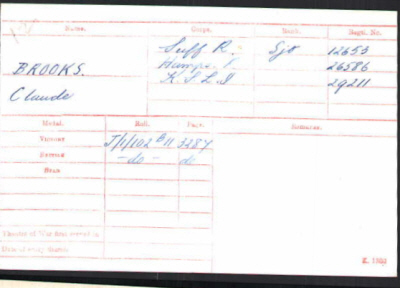
photo: Rodney Gibson photo:Rodney Gibson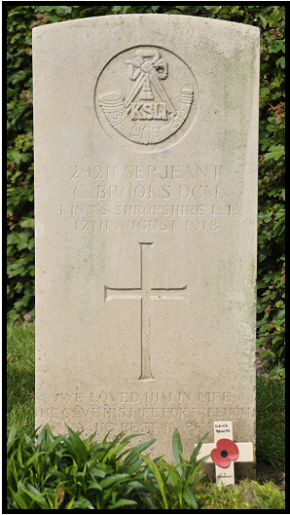
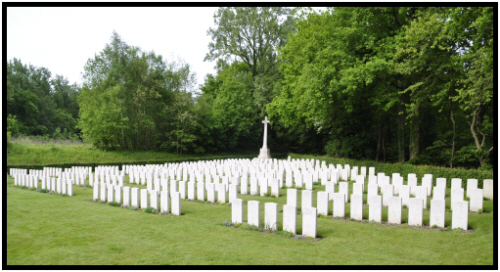
click here to go to the Commonwealth War Graves Commission website for full cemetery/memorial details